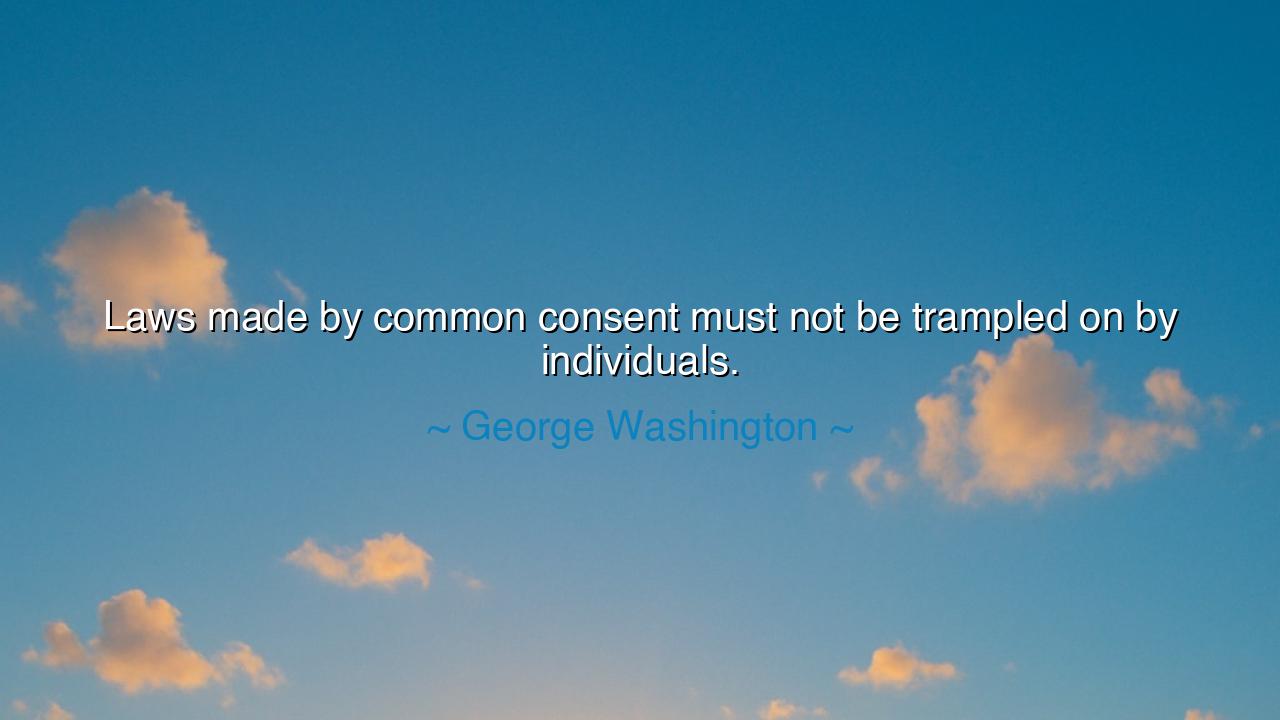
Laws made by common consent must not be trampled on by






The words of George Washington, “Laws made by common consent must not be trampled on by individuals,” resound like a command carved in stone, a truth meant not for a single generation but for all who would dwell within the bounds of civilization. These words are not cold, lifeless utterances, but the living breath of a man who had seen with his own eyes the chaos of war, the peril of rebellion, and the fragile birth of a nation. They are the wisdom of one who knew that without respect for law, liberty itself would collapse into dust.
The origin of this quote springs from the soil of the American Revolution and the perilous years that followed. Washington, revered not only as a general but as a guardian of the republic, understood that freedom is no wild stallion left untethered, but a noble horse that must be guided by reins woven of common consent. The laws are these reins—crafted not by tyrants nor imposed by kings, but forged in agreement among equals, hammered into form by the will of the people. To trample upon such laws, he warned, was not merely to break a rule, but to shatter the covenant that held a people together.
Consider the story of the Whiskey Rebellion in 1794. Farmers of western Pennsylvania, enraged by a tax on distilled spirits, rose up in defiance, believing themselves wronged. They burned houses, threatened officers, and sought to resist the government’s decree. Yet Washington, though sympathetic to the burdens of the common man, would not allow the law, passed by elected representatives, to be overturned by violence. He gathered the militia and marched to quash the uprising, not with vengeance, but with resolve. He showed the young nation that while dissent is sacred, destruction of lawful order is perilous. In this, he demonstrated that the authority of law must stand above the will of any single individual or mob.
From this tale shines a timeless truth: a people may disagree, a people may protest, but if they destroy the foundation of their common consent, they unmake the very bedrock of their freedom. Without shared respect for law, no city can stand, no nation can endure, no family can flourish. For when each man becomes a law unto himself, the land is plunged into the wilderness of anarchy, where only the strong devour the weak, and justice is drowned beneath the flood of selfish will.
And yet, Washington’s words are not chains of tyranny—they are shields of liberty. For laws made by common consent are not the decrees of despots, but the pledges of neighbors, written in ink and bound by trust. To honor them is to honor the voice of the people, the collective spirit that seeks peace in the marketplace, safety on the roads, fairness in the courts. To trample them is to dishonor one’s fellow citizens, to raise oneself above the whole, and to spit upon the very idea of shared destiny.
Let the lesson ring clear: freedom and order are not enemies, but companions. The laws, if born of true common consent, are the guardians of the weak, the checks upon the powerful, and the covenant of equality. To uphold them is noble; to scorn them is to betray not only the nation, but one’s own integrity.
Therefore, let each man and woman live as a steward of justice. Speak out when laws are unjust, but do so through rightful means, not through trampling chaos. Engage in the assemblies of the people, raise your voice in the courts of debate, and strive to shape the laws with wisdom and fairness. But once the covenant is made, let it be honored, lest the fire of discord consume all.
So remember Washington’s words: laws made by common consent are not mere rules etched on paper; they are the sacred bonds of a people’s unity. Hold fast to them, defend them, and work to make them just. For in doing so, you stand not only as a subject of law, but as its guardian, ensuring that liberty may endure not for one, but for all.






AAdministratorAdministrator
Welcome, honored guests. Please leave a comment, we will respond soon